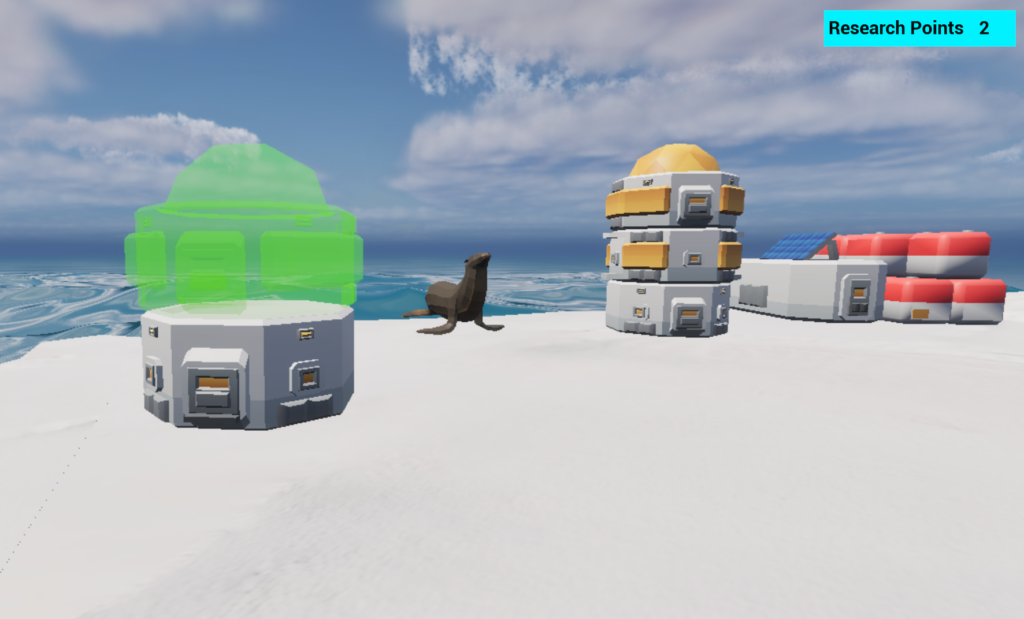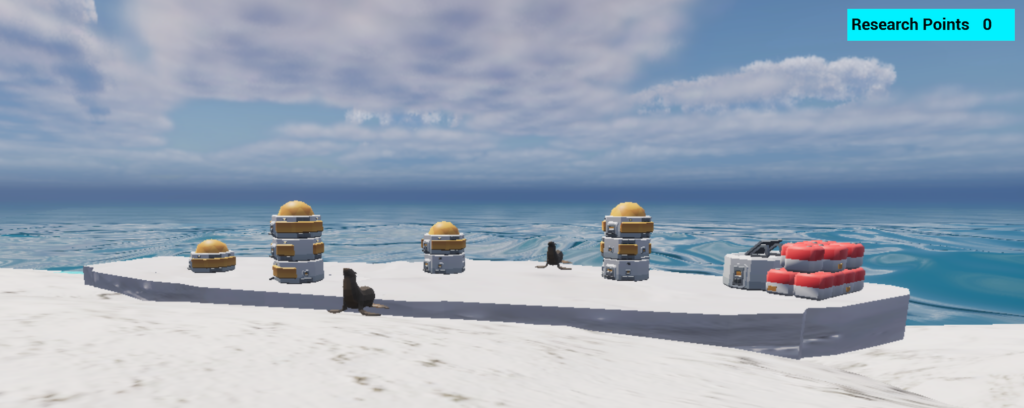last updated 2025 August 1
Exploring Iceberg Life Cycles through Visualization and Gamification
Researchers: Olivia Patterson, Rebecca Williams
Introduction + Background
Understanding the iceberg life cycle—from calving to drifting, fracturing, and melting, is useful to climate
scientists because melting icebergs release freshwater and nutrients into the ocean, and contributes to sea ice and ocean currents, all of which are important contributors to scientific models of sea level rise. Visualization of these processes aid scientists in development and understanding of more accurate climate models, and visual narration of compelling stories about specific calving events can help scientists engage the public and highlight the significance of these processes in the broader context of climate change. Prior studies [2,4] have found that video games can help encourage people to think about and advocate for climate resiliency. Within the game, we focus on an iceberg named A68, which broke off from the Larsen C ice shelf in July 2017. It quickly fractured into two pieces: A68A and the smaller piece A68B, and continued to fracture until it’s eventual demise in April 2021.
Screen capture of Video Game


Creation
- Using lat/long data from the US National ICE Center [1]
- Python, matplotlib, numpy, and scipy to create a 2D plot of lat/lon, pchip for time Interpolation, for each fragment
- Matplotlib to create animated plot to show the movement of A68 and “bergy bits”
- Importing these positions into Unreal Engine [3] to create a first-person game
Video of Game Play
Key Publications
Olivia Patterson and Rebecca Marie Williams. 2025. Glacial Guardians: Development of a Data-Driven Educational Video Game Exploring Antarctic Iceberg Lifecycles. In IGARSS 2025 – 2025 IEEE International Geoscience and Remote Sensing Symposium, August 03, 2025. IEEE, Brisbane, Australia, 3334–3339. https://doi.org/10.1109/IGARSS55030.2025.11243248
Key Presentations
- Patterson, O., & Williams, R. (2024). Glacial Guardians: Development of a Data-Driven Educational Video Game Exploring Antarctic Iceberg Lifecycles. Presented at the Summer Undergraduate Research Fest (SURF), University of Maryland, Baltimore County, August 7, 2024.
- Patterson, O., & Williams, R. (2024). Glacial Guardians: Development of a Data-Driven Educational Video Game Exploring Antarctic Iceberg Lifecycles. Presented at the NASA Student Research Poster Session, University of Maryland, Baltimore County, October 17, 2024.
- Patterson, O., & Williams, R. (2024). Glacial Guardians: Development of a Data-Driven Educational Video Game Exploring Antarctic Iceberg Lifecycles. Presented at GRIT-X Research Showcase, University of Maryland, Baltimore County, October 24, 2024.
- Patterson, O., & Williams, R. (2025). Glacial Guardians: Development of a Data-Driven Educational Video Game Exploring Antarctic Iceberg Lifecycles. Presented at the College of Engineering and Information Technology (COEIT) Research Day, University of Maryland, Baltimore County, April 11, 2025.
Citations
[1] “U.S. National Ice Center” usicecenter.gov. https://usicecenter.gov/ [2] H. Miao, M. S. M. Mohamad Saifudin Mohamad, and I. A. Zolkepli, “Gamification as a Learning Tool for Pro-Environmental Behavior: A Systematic Review,” Research Gate, Dec. 2022. [3] Epic Games, “Unreal Engine | The most powerful real-time 3D creation tool,” Unreal Engine, 2023. https://www.unrealengine.com/en-US [4] T. Ouariachi, M. D. Olvera-Lobo, J. Gutiérrez-Pérez, and E. Maibach, “A framework for climate change engagement through video games,” Environmental Education Research, vol. 25, no. 5, pp. 701–716, Dec. 2018 [5] “The A-68 story,” www.esa.int.https://www.esa.int/Applications/Observing_the_Earth/The_A-68_story
